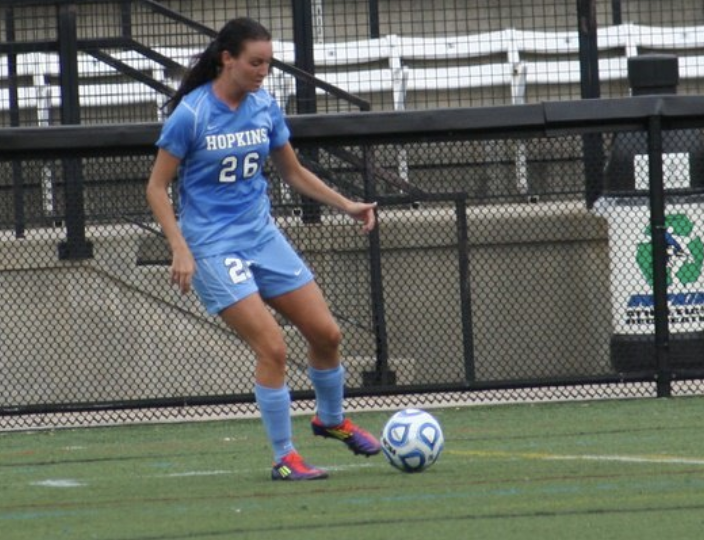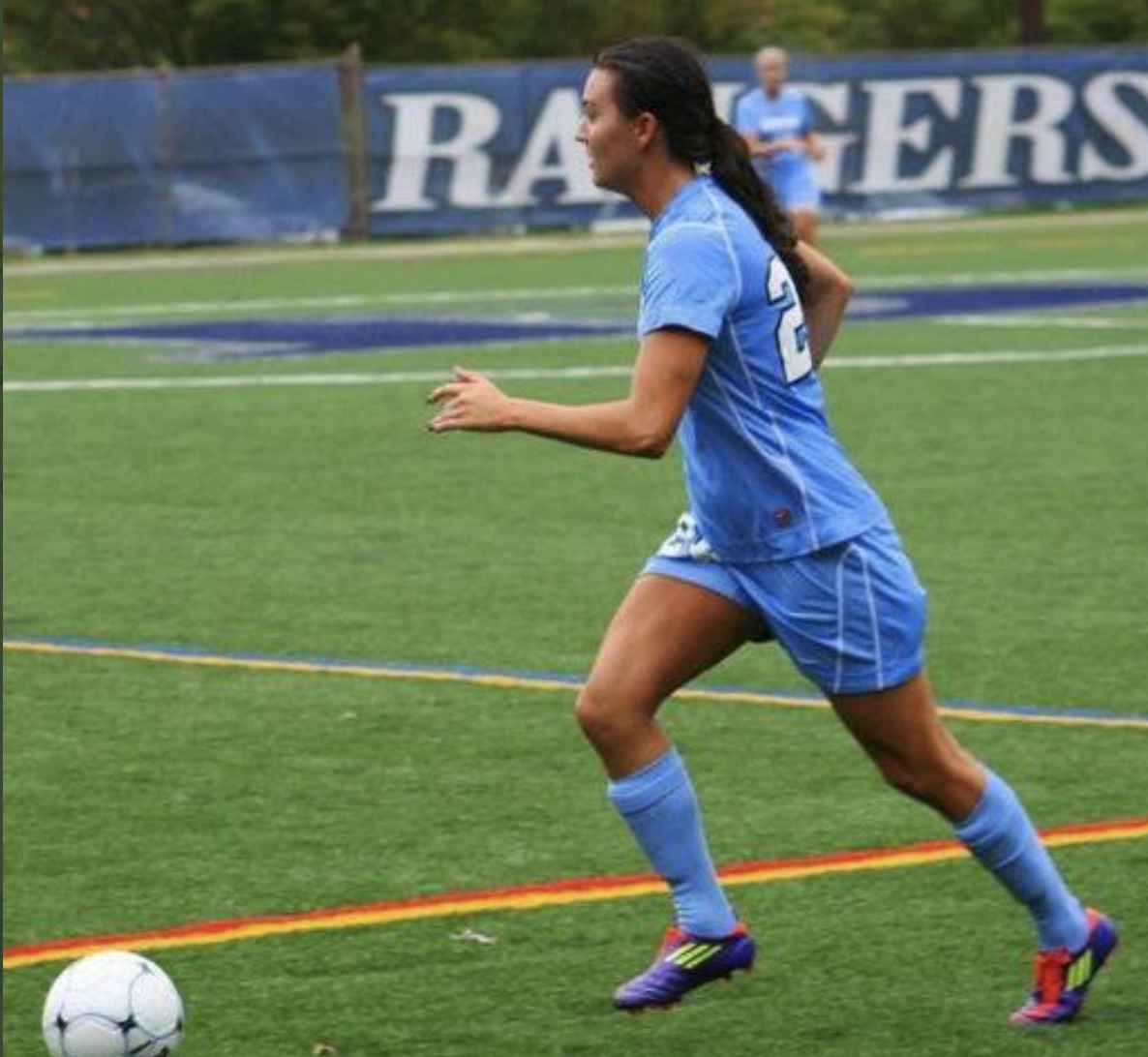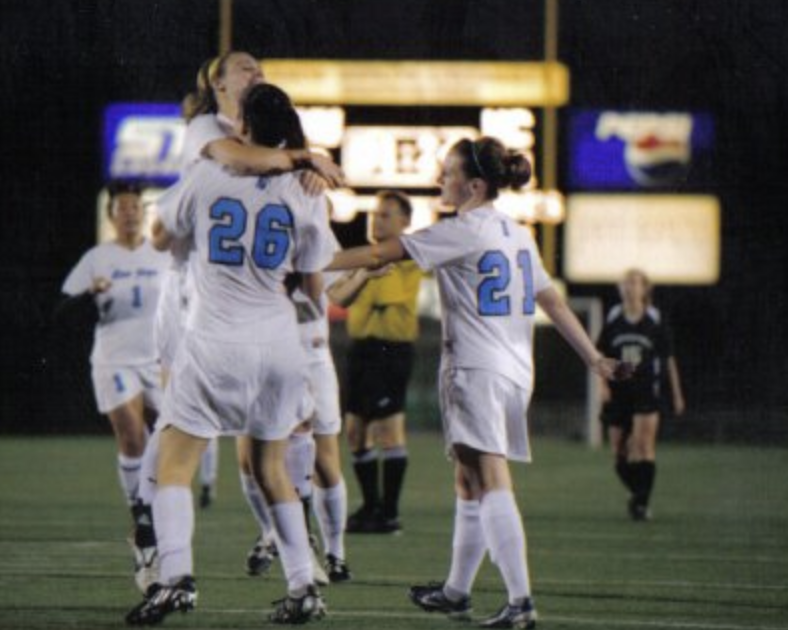
01 Sep What Parents Aren’t Told About College Recruiting
I got recruited at a high school soccer game.
Yes, you heard me right. A high school soccer game.
Mind you, it was a state championship final, and we were one of the top high school teams in Maryland who produced Division I beasts. The level was immensely high and we had a record of 18-0 my junior year. The Johns Hopkins University coach was eager to see me play and see if I was a fit for his team.
It’s worth mentioning that he saw me play at a travel showcase tournament a few months prior, and that was when my sharp left footed, explosive and creative playing style peaked his interest in having me join his program.
After winning my high school state final my junior year, I received a glowing email from him that lauded my playing, and he offered me a spot on the Johns Hopkins University women’s soccer team right away.

I got recruited at a high school soccer game.
This would be considered crazy in today’s college recruiting climate that is flooded with tournaments, showcases, ID camps, social media highlight reels, more showcases, and more ID camps.
Adding on to the chaos, there’s a rolling list of college recruiting companies that offer highlight video, networking and placement services that cost a pretty penny, and leave parents with a net zero or negative money, even if their kid gets the scholarship.
There's a rolling list of college recruiting companies that offer highlight video, networking and placement services that cost a pretty penny, and leave parents with a net zero or negative money, even if their kid gets the… Share on XDon’t get me wrong, I can name a meager amount of college recruiting companies I actually trust and who have a high success rate of sending kids to universities that fit them athletically and academically, but parents need to be discerning in who they hire and look at their body of work deeply. Too, parents need to realize they will fork out a lot of dollars for these services, and not all of it will come back in monetary value.
I guess you can say I’m lucky that the recruiting process was cheap, almost free, for me and wasn’t some grandiose luxury. Instead of leading with how much money my parents had in their wallets, I stood out by showing up to the field, playing my heart out, and putting in the daily work to master my playing craft.
And this is the first thing parents aren’t told about college recruiting: you don’t have to fork out as much money as you think.
And this is the first thing parents aren't told about college recruiting: you don't have to fork out as much money as you think. Share on XEveryone assumes you need to be on the top team, pay the most yearly dues, and attend club college ID nights, but these aren’t deal breakers.
Now in the age of social media, kids can market themselves for free. With the limited budgets of college coaches, and the less desire to travel because they crave family time, recruiting off social media is becoming more attractive.
So let’s start here first: get your kid on social media, especially Twitter.

It’s easy to put together a series of highlight reels and starting tweeting your heart out. One of my favorite apps for putting together video clips is Splice. It’s easy to use and within seconds, you have a high quality reel to showcase to college coaches on Twitter.
Within these reels, highlight the entirety of you kid’s playing – goal scoring, play making, being aggressive, winning air balls, tackling an opponent, or winning under pressure situations.
When is the best time to get your kid’s videos on social media?
As young as 8th grade is an excellent start. One of the biggest issues I see with young athletes is they start the recruiting process too late, and stumble into ID camps their junior year when college coaches have NO CLUE who they are. They had no social media presence, or communication before the camp. Do kids really think the coach will notice them amidst hundreds of girls who attend their camps?
It becomes even more problematic when a kid feels they have to scramble and go to tons of ID camps, forcing the parents to fork out more money. Had they done their homework and gained a presence on social media before all of this, they could have narrowed down their ID camps better and saved time and money.
Moving on…
You’re probably wondering if you need to be the richest family in the neighborhood to expose your kid to amazing opportunities.
No, you don’t need to pay expensive dues to be on the top team to get recruited at a top school.
No, you don't need to pay expensive dues to be on the top team to get recruited at a top school. Share on XAs a former recruiter for Johns Hopkins University, a lot of the girls we picked were not always on the top teams and played in the top leagues. The girls who showed up to our ID camps who stood out were the ones who had the following traits:
1. Grit
2. Leadership
3. Physical capability (speed especially stood out)
4. Personality
5. Cheered on other girls
College recruiting is as much as character as it is talent.
College recruiting is as much as character as it is talent. Share on XHow girls speak to others matters. What girls post on their personal social media pages matters. How girls cheer on others matters. How girls lead as well as be teammates matters.

The technical, tactical and physical capabilities of girls matters in recruiting, but their character is what sets them apart.
The technical, tactical and physical capabilities of girls matters in recruiting, but their character is what sets them apart. Share on XToo, luck and timing has a lot to do with the process. A coach of a college program can be looking for specific personnel at the time, and maybe your kid is a talented forward, but the coach needs a defender. It’s nothing personal, it’s personnel. Luck does have a lot to do with it, as the timing needs to be right.
However, I will say, the harder girls work, the luckier they get. Meaning, the more they put in the work to develop their playing through the holistic lens – technical, tactical, physical and mental, the more they create opportunities for themselves.
Practicing skills on their own time. Putting themselves in more challenging tactical environments (I played pick up soccer with the boys leading up to college). Working on building their strength. Staying healthy. Keeping their mind sharp. Handling adversity with grace. Sharpening their capacity to overcome mistakes. This all matters, and they’re tools that aren’t just applicable to college sports, but for a lifetime.
What Is The End Goal?
I invite parents to ask themselves when they sign their kid up for more training, more lessons, more camps, more top club teams, and more, more, more what is the end goal? Is it just the scholarship?
Or is there something deeper that you’re drawn to for you kid?
Let’s enter a dream world: say your kid gets the scholarship out of the itty bitty percentage that do, what did they learn along the way about themselves? What did they take from sports that will last them after it all ends? Because it will end one day, and they need to have a greater purpose to put in the work, to train, and to grow their multitude of talents. Your bank account will get depleted along the way, so what is totally worth these costs? Is the return on investment the scholarship? Or is it the enriching experience of developing as a player and human?
Alas, getting a full ride scholarship is in fact a dream world. What parents aren’t told is how the odds are against their kid, and only a select few (1 in every 57 athletes) go on to play at the Division I level.
Worst case, if they don’t get the scholarship, or go to a top school, what do they have left? What is the end goal then?
None of this is to be pessimistic, but it’s to be realistic in your expectations and what you want your child to get out of their sport career.
Taking the conversation back to the amount of money parents spend on college recruiting and getting their child ahead, not all of it will come back in monetary value, which is why there needs to be a greater purpose to all of this. The return on investment needs to be beyond cash.
Do you want your kid to gain valuable life experience?
Do you want them to be invigorated by the process?
Do you want them to be oozed with joy?
Do you want them to be excited about becoming healthy humans?
Do you want them to be disciplined in their daily physical and mental habits?
Do you want them to stay focused in academics and grow their skill sets beyond sport?
Most importantly, do you want them to be prepared for the sport called life?

And if you don’t want to spend the money, you don’t. That’s your choice.
Just know that it is possible to send your kid to an amazing program that fits them at minimal cost, and various D I, II, III and Junior College programs are excellent for athlete development, as well as an unmatched academic experience.
You just have to follow your own journey, not what your neighbors are doing and not what the system is telling you to do.
You just have to follow your own journey, not what your neighbors are doing and not what the system is telling you to do. Share on XGet the TOTAL YOUTH SOCCER FITNESS EBOOK ON SALE FOR JUST $29 HERE
Get a year-round youth speed, strength and conditioning program TOTAL YOUTH SOCCER FITNESS 365 HERE
For coaching education, a 15 Module video library and in depth Zoom sessions on training the youth female athlete beginning last Tuesday of each month, join my FEMALE ATHELTE FITNESS MENTORSHIP HERE


Alan Quackenbush
Posted at 13:56h, 03 SeptemberMaybe I’m a dinosaur and are a bit jaded after 40+ years but here goes:
Forget the scholarship…..the intoxicating process of recruiting is for parents and bragging rights.
Put together the highlight reel, visit schools, find the “right” youth team, not the best team, but ultimately find the SCHOOLS you’d like to attend. They all have athletic programs and you’ll participate. If you’re career ends tomorrow, you’ll be at a school you’ll like and be happy at. Most athletes will play at D2 and D3 anyway and that is more fun.
“what did they learn along the way about themselves? What did they take from sports that will last them after it all ends? Because it will end one day, and they need to have a greater purpose to put in the work, to train, and to grow their multitude of talents. Your bank account will get depleted along the way, so what is totally worth these costs? Is the return on investment the scholarship? Or is it the enriching experience of developing as a player and human?”
That’s it in a nutshell 🙂
erica
Posted at 14:36h, 03 SeptemberAGREE!!!!!!